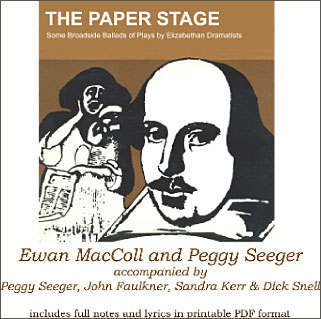Ewan MacColl and Peggy Seeger’s The Paper Stage
29. 7. 2009 | Rubriky: Articles,CD reviews
 [by Ken Hunt, London] Forty years or so ago, Ewan MacColl and Peggy Seeger released their most recondite project, the two-volume Paper Stage. It was reconstructions of the first Elizabethan Age’s theatre for the second Elizabethan Age. The original peddlers of these more unauthorised than guerrilla playlets in song left few traces and fewer fingerprints. All that survived was the printed page. Theirs was street theatre, the equivalent of graffiti artist Banksy’s Mona Lisa with a rocket launcher, or that Banksy rat sawing a getaway hole to freedom through the pavement. Without forcing the analogy, the Paper Stage material somehow survived on paper without the accompanying music, just as Banksy’s long-gone, ephemeral spray paintings and stencil art images survive as photographic images in the book Wall And Piece without the walls.
[by Ken Hunt, London] Forty years or so ago, Ewan MacColl and Peggy Seeger released their most recondite project, the two-volume Paper Stage. It was reconstructions of the first Elizabethan Age’s theatre for the second Elizabethan Age. The original peddlers of these more unauthorised than guerrilla playlets in song left few traces and fewer fingerprints. All that survived was the printed page. Theirs was street theatre, the equivalent of graffiti artist Banksy’s Mona Lisa with a rocket launcher, or that Banksy rat sawing a getaway hole to freedom through the pavement. Without forcing the analogy, the Paper Stage material somehow survived on paper without the accompanying music, just as Banksy’s long-gone, ephemeral spray paintings and stencil art images survive as photographic images in the book Wall And Piece without the walls.
The year The Paper Stage came together – 1968 – was a year of great flux. It seemed as if it might turn into a watershed year, another 1848 in revolutionary terms. The Vietcong were on the offensive, in the USA Martin Luther King and Bobby Kennedy were gunned down, Paris, if not France, had its événements and Alexander Dubcek’s Prague Spring was chain-sawed in the bud by Warsaw Pact troops. As frequently happens under repressive regimes, a blossoming of literature and folk poetry occurs. The eight broadside ballads that are The Paper Stage‘s raw material were circulating in a similarly politically charged climate. They were by-products of xenophobia, fear of religious extremists and religious intolerance. Gerontus, The Jew Of Venice reflects that, while A Warning Piece To England Against Pride And Wickedness says it all in the title. “Anything was grist to the mill for the broadside,” laughs Peggy Seeger. “Somebody said, a cat only needs to peep round the corner and some broadsheet seller is selling it by the yard.”
The street performers that delivered these pieces then ducked and dived to sidestep censorship that coloured, conditioned and encrypted Elizabethan and Jacobean plays. Theatre was trickle-down television and film combined. Or like modern-day Trotters and Arthur Dalys they flogged their potted, pirated Taming Of The Shrew or King Lear And His Three Daughters wares to make their daily bread.
The Paper Stage is abridged theatre with a turn of speed, ready to leg it when the lookouts spot the Tudor regime’s killjoys bee-lining towards the gathering. That idea planted a seed. MacColl, Seeger and the Critics Group’s John Faulkner, Sandra Kerr and Dick Snell contemporised their instrumentation deliberately evoking the getaway spirit with portable instruments. They play modern-day ‘folk instruments’ – guitar, tin whistle, concertina and dulcimer – with which light-heeled agit-prop actors or street musicians could run. Implicitly it revisited the ‘appropriate accompaniment’ debate that had occurred during the 1960s. “And tune themselves, quickly,” she adds.
The Paper Stage is the missing link in MacColl and Seeger’s chain of work. It bridges the Bard of Beckenham’s early agit-prop theatre and dramatist past, his love of theatrical history and street-corner minstrelsy. “Ewan loved the Shakespeare plays,” Seeger recalls, “and certain of them he was fascinated by. Titus Andronicus, which is very cruel, for example. He was excited by the theatricality of ballads and the musicality of the speech of Shakespeare. These versions were very singable. That was the thing about them. Very singable. When you look at some of the flowery language that was going on in Elizabethan songs, these stories were almost built like the classic ballads.”
How come The Paper Stage is barely known beyond its title? In Ben Harker’s biography, Class Act – The Cultural And Political Life Of Ewan MacColl (2007) it gets a total of 37 words while MacColl’s own highly selective autobiography Journeyman (1990) makes no mention of the project. There are several possibilities. Many people had developed MacColl and Seeger project fatigue, just as they had the folk cadres’ reviews. There was an awful lot of MacColl and Seeger and it cost an awful lot. Once upon a time, Chorus From The Gallows (1960) about criminals and criminality had lasted one record; at another extreme The Long Harvest ran to ten volumes.
To put it into some sort of financial context, that represented a considerable investment and a great deal of budgeting making a 10-LP set the stuff of public library acquisition. Last, they had to overcome the growing if not prevailing perception that their scholarly inclined, themed work was overly earnest. This reissue provides the first real opportunity to reappraise this project’s importance – or appreciate it for the first time. Do so.
With thanks to Sofi Mogensen at fRoots.
The Paper Stage (CAMSCO 702d, 2008)
Disc 1:
1 The Taming of a Shrew
2 King Lear & His Three Daughters
3 Arden of Faversham
4 The Frolicksome Duke, or The Tinker’s Good Fortune
Disc 2:
5 Titus Andronicus’ Complaint
6 Gerontus, The Jew of Venice
7 The Spanish Tragedy
8 Warning Piece to England